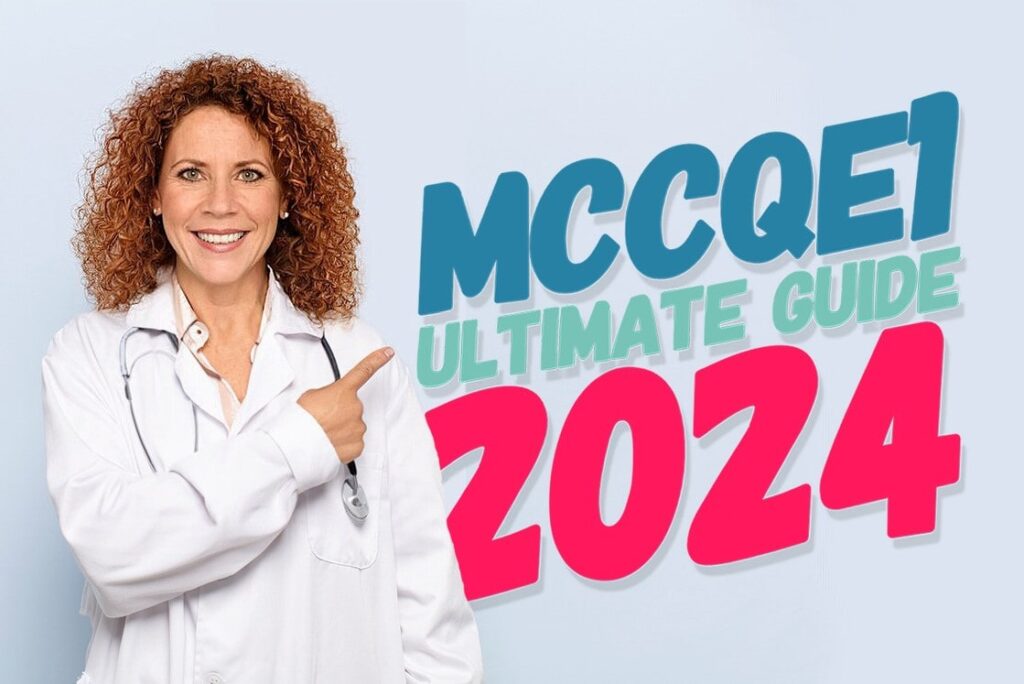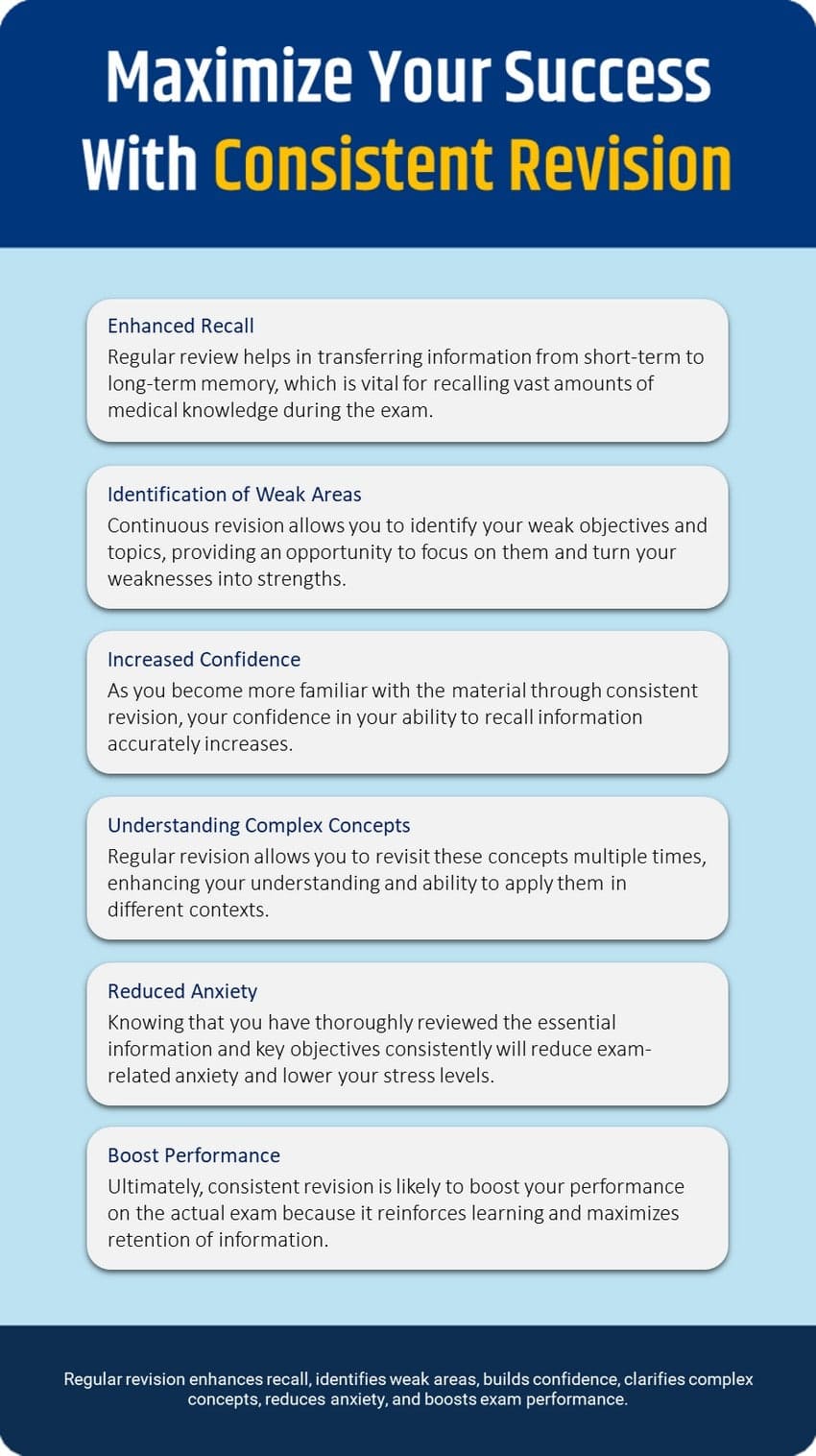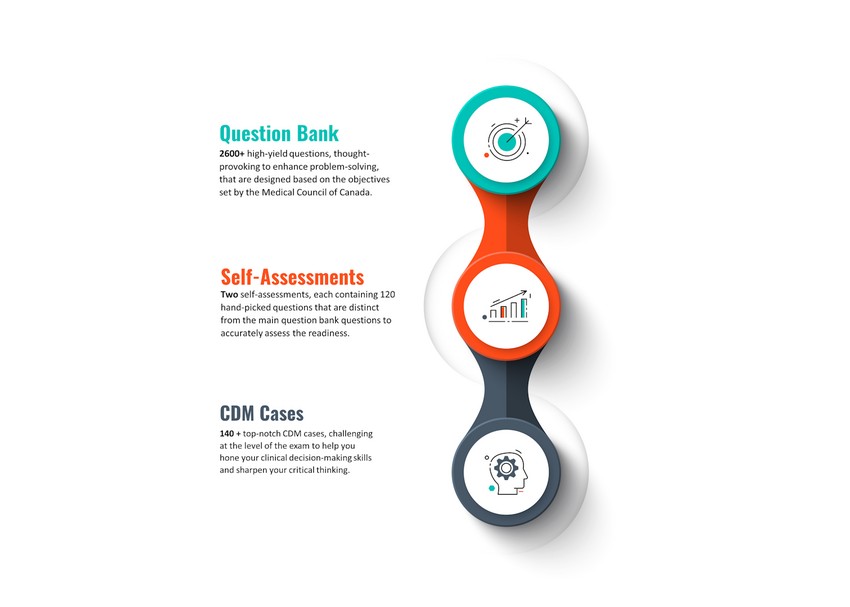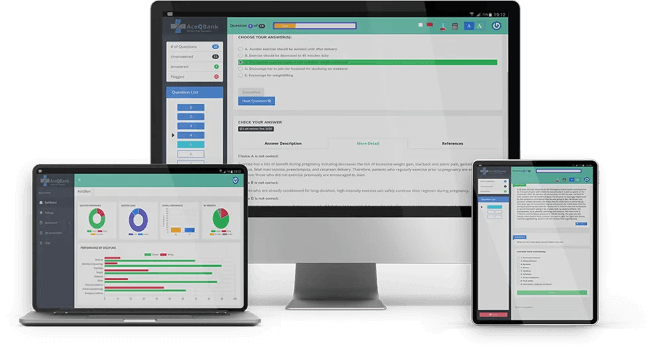MCCQE Part 1: A Comprehensive Guide to Success 2024

Undeniably, the journey towards becoming a physician in Canada demands effort and commitment. One significant step within this intricate process is clearing the Medical Council of Canada Qualifying Examination (MCCQE) Part 1. The exam symbolizes a pivotal point for accreditation, assessing both domestic medical students’ and international graduates’ expertise in the field; specifically measuring their clinical knowledge base and decision-making capabilities.
However as candidates prepare for this exam they often find themselves grappling with perplexing questions. These concerns are entirely valid, such as “Which textbook would be most helpful?”. Which question bank is recommended for the exam?” Many medical graduates are searching for resources that can not help them pass but also excel in the exam.
Recognizing its significance this article aims to provide an overview of the MCCQE1. From understanding its structure to preparation methods our goal is to equip you with valuable insights and detailed information that will empower you to navigate this critical assessment with confidence. We want aspiring medical graduates to feel well prepared to overcome the challenges of the exam and pursue their career aspirations, within Canada’s healthcare system.
Understanding the MCCQE Part 1
The MCCQE Part 1, a pivotal step in obtaining the Licentiate of the Medical Council of Canada (LMCC) designation, reflects a history of evolving standards in medical education and practice. Initially a gateway to provincial licensure post-examination, its criteria expanded in the mid-nineties to include additional training. Today’s candidates face a rigorous assessment aligned with the CanMEDS roles, ensuring a broad spectrum of medical care and physician activities are covered.
Prospective examinees must navigate a detailed registration process through their physiciansapply.ca account, where scheduling is based on availability at over 500 Prometric test centers globally or via remote proctoring. The exam blueprint dictates a structure comprising multiple-choice questions (MCQs) and Clinical Decision Making (CDM) cases, each with specific content weightings. On exam day, time management is crucial as the computer’s clock dictates the pace, with warnings to alert candidates as time dwindles.
Preparation should be methodical, starting with medical school notes and textbooks and incorporating hands-on patient encounters. The study strategy should balance the demands of final-year medical school activities with thorough reviews of essential topics and practical experiences.
This was an overview of the exam format and registration process, just to familiarize you with the entire process. However, one thing that is often not mentioned and not paid attention to is the CanMEDS roles.
As an International Medical Graduate, it’s essential for you to understand the significant role CanMEDS plays in MCCQE1. Developed by the esteemed Royal College of Physicians and Surgeons of Canada, this crucial framework is not only vital to your education but holds great value in clinical practice too. It outlines indispensable skills that help doctors address their patients’ needs.

At its heart, CanMEDS delineates seven pivotal roles that are integral to the practice of medicine. These roles are not isolated silos; rather, they are synergistic elements that, when harmoniously integrated, equip physicians with a holistic approach to healthcare delivery.
Embracing the CanMEDS roles is not just about personal mastery; it signifies a commitment to excellence, a dedication to lifelong learning, and a pledge to contribute positively to the collective medical community in Canada. For those who are on the journey to join the ranks of esteemed medical professionals in this country, understanding and integrating the CanMEDS framework into your practice is not just recommended—it is imperative. These abilities are grouped into seven key roles:
- Medical Expert (central role)
- Communicator
- Collaborator
- Leader
- Health Advocate
- Scholar
- Professional
Each role is defined by a set of competencies that physicians should develop during their training and continue to demonstrate throughout their careers. The CanMEDS framework is widely utilized in medical education and professional development programs to enhance the quality of healthcare. It plays an important role in the exam. We discussed its details and discussed the significant role it plays.
What to Expect on the MCCQE1?
Embarking on the MCCQE Part 1, candidates will navigate a one-day, computer-based test designed to gauge medical expertise through two main sections. The morning session challenges with 210 Multiple-Choice Questions (MCQs), while the afternoon session delves into Clinical Decision-Making (CDM) with 38 cases. It’s essential to understand that the MCQs include 35 pilot questions that don’t affect the score but are indistinguishable from scored items. Therefore, thoroughness of each question is crucial.
The exam scrutinizes proficiency across eight domains under two overarching categories: Dimensions of Care and Physician Activities. These span critical facets like health promotion, acute and chronic care management, communication, and professional behaviour, each with its own weightage in the exam. The CDM section further tests candidates with short-menu and write-in questions, where specificity and medical terminology are key to maximizing scores.
Success hinges on a robust understanding of all medical disciplines, reflecting the comprehensive nature of the exam. A strategic study plan that targets weak areas and reinforces strong ones, coupled with practice using realistic simulations, can help ensure a well-rounded preparation.

What are CDM cases in MCCQE Part 1?
The Clinical Decision-Making (CDM) component is a pivotal part of the MCCQE Part I exam, assessing candidates’ abilities to follow the instructions with precision. This segment involves 38 cases in total, which are followed by questions.
The questions are designed to challenge you to employ critical thinking in eliciting information, ordering diagnostic procedures, making diagnoses, and prescribing therapy. Mastery here reflects one’s readiness to manage real-world patient scenarios.
CDM questions come in two flavours: short-menu and write-in. The short menu resembles a multiple-choice format but with a wider array of up to 15 options, while the write-in requires typed responses. It’s crucial to adhere to the question instructions, as these dictate the valid number of responses and directly influence scoring.
Staying abreast of Canadian clinical guidelines is also essential, as decisions must align with national standards of care. A thorough understanding of these guidelines and proper management steps is not just beneficial for the CDM part, but is indicative of a candidate’s competence in delivering quality healthcare.
For proper preparation, resources like Ace Qbank offer high-yield CDM cases to hone decision-making skills in line with the MCC objectives.

Why should I know about the MCC objectives?
The Medical Council of Canada (MCC) objectives serve as a detailed guide that delineates the knowledge, skills, and behaviours expected of candidates. They are the core around which the exam is structured, with clinical cases and multiple-choice questions derived from these objectives.
Delving into the MCC objectives transforms your preparation for the MCCQE Part I exam from a mere study routine into a strategic conquest. The objectives are not just a list; they are the very essence of the exam, meticulously crafted to encapsulate the competencies that a practicing physician in Canada must possess. Every clinical case and every question on the exam is a direct reflection of these objectives, making them the most reliable compass for navigating the sea of medical knowledge you must master.
Grasping these objectives should be seen as a personal mission if you are to excel in the MCCQE Part I. They provide a rich, structured outline that goes beyond rote learning. Ensuring that every study session propels you closer to your goal. Immersing yourself in resources like Ace QBank, which meticulously aligns its content with the MCC objectives and even cites them in each question’s reference section, is akin to having a tailored roadmap for success.
Remember, a robust understanding of the MCC objectives is much more than academic—it’s a litmus test for your future performance. The objectives shine a spotlight on the core elements that examiners deem critical, giving you a clear indication of where to focus your energies. They are not arbitrary; they mirror the national standards for physicians in Canada, serving as a benchmark for excellence in healthcare.
Embracing the MCC objectives is a declaration of your commitment to both your immediate success on the MCCQE Part I and your enduring pursuit of medical excellence. This strategic step does not just prepare you for an exam. It prepares you for a thriving career in medicine. Ensuring that you meet and exceed the professional expectations set forth by Canadian medical standards.

How Do I Prepare for MCCQE Part 1?
In order to effectively prepare for the MCCQE1 exam. It is crucial to establish a meticulously structured study plan. The initial phase should involve identifying areas of unfamiliarity and assigning designated time slots for each topic.
Stick to your schedule closely to keep a steady rhythm in your studies and be fully prepared by exam day. However, you need to incorporate active learning techniques into your study regimen to enhance understanding and retention of complex medical concepts. Utilizing a question bank is a pivotal aspect of your preparation. Qbank provides insight into the exam’s structure and question formats, allowing you to adapt your studying strategy accordingly.
Reviewing and revising content is the other thing. Make sure to revisit previously studied topics periodically to ensure the information is firmly embedded in your long-term memory. This continual process of revision will help prevent the decay of knowledge over time and keep you sharp for the day of the exam.
One thing you should never overlook is how important it is to take care of yourself while getting ready, for the MCCQE1. Getting sleep plays a role in keeping your cognitive abilities at their best. When your mind is well rested it becomes more effective, at learning solving problems and remembering information.
For those preparing for the exam, study methods can be segregated into several categories—each playing an instrumental role in comprehensively mastering the exam content. Here are five principal categories presented:
- Planning and Organization
- Active Learning
- Assessment your progress
- Collaborative Learning
Planning and Organization
Starting is always difficult. With proper planning, you can set a strong foundation for your MCCQE1 exam preparation. The key is to develop a structured approach that covers all the components of the exam while also fitting into your personal life and learning style. Here’s how to proceed:
- Understanding the Exam Format and Content
- Creating a Study Plan
- Setting Goals
Understanding the Exam Format and Content
It’s crucial to understand the blueprint of the exam which outlines the specific competencies and physician activities defined by the Medical Council of Canada.
It’s truly important that you should immerse yourself in understanding the MCCQE1 format. This includes navigating through multiple-choice questions and solving clinical decision-making cases. The breadth of the MCCQE Part 1 extends to all aspects of key medical knowledge and critical clinical skills, requisites for stepping into supervised clinical practice.
This is only achievable by using a Canadian resource that understands the challenge at hand and provides quality solutions to help. Ace QBank has provided medical graduates with over 2600 high-yield questions and over 140 top-notch CDM cases. The best part is that questions and CDM cases are thought-provoking and at the level of the MCCQE1 difficulty.
Beyond the questions and CDM cases, the question bank has also offered self-assessments so candidate can assess their readiness before taking the exam.
Creating a Study Plan
Crafting a tailored study plan for the MCCQE1. Begins with breaking down the exam blueprint into manageable study sections. Allocate sufficient time to each discipline such as Internal Medicine, Pediatrics, Psychiatry, Surgery, Obstetrics and Gynecology, and Public Health. Create milestones that align with the competencies required. Then set deadlines for reviewing each subject area. Your plan should be dynamic, allowing for adjustments.
Adhering strictly to your study schedule is essential for effective MCCQE1 preparation. Regularly evaluate your progress against your set goals and adjust your study plan and schedule accordingly. Remaining disciplined in your approach will ensure comprehensive coverage of all necessary material. Keep in mind that flexibility is important—life events may necessitate adjustments to your plan, but the key is to maintain course toward your ultimate goal of passing the MCCQE1.
Setting Goals
Set a goal for your MCCQE1 prep. The goal might involve mastering specific content areas or completing a certain number of practice questions each week.
Establish specific, measurable, achievable, relevant, and time-bound goals for your preparation. For instance, you might set a goal to cover pediatrics-related content within two weeks, ensuring you properly cover all related objectives. These goals will guide your daily activities and give you a sense of accomplishment as you progress.
These goals will act as motivators and checkpoints throughout your preparation journey.
Active Learning
Among all strategies, active learning stands out as a superior approach. However, you need to use a question bank tailored to the MCC objectives, such as Ace QBank.
One key aspect of active learning is interleaved practice with questions. This technique involves mixing different disciplines while studying rather than focusing on one area at length before moving to the next. Interleaved practice challenges the brain to continually adapt and apply knowledge in varying contexts, leading to deeper understanding and improved problem-solving skills.
It’s essential to remember that the effectiveness of this approach primarily resides in its application within disciplines with which you are familiar. Combining known disciplines with the unknown may prove unfruitful without prior understanding and knowledge. If executed correctly, this practice can indeed be extremely beneficial.
Another cornerstone of effective studying is spaced repetition, a complementary strategy that works hand in hand with active recall. Review material at increasingly spaced intervals. You can exploit the psychological spacing effect to enhance long-term retention of information. While the idea might seem unconventional at first, you will undoubtedly appreciate its value upon trying.
Employing the technique of practicing under conditions mirroring those of the actual exam is another powerful approach. Practicing under simulated exam conditions means creating an environment similar to the test setting, adhering to time constraints, and completing the question block in one sitting. This strategy not only tests your knowledge but also builds stamina and reduces anxiety, allowing you to perform confidently when it matters most. It also helps you develop or hone on test-taking strategies.
Assessment your progress
Self-assessment truly helps in identifying our areas for improvement. This prompts the important question, when should we ideally conduct this self-assessment?

The answer is easy. However, the ultimate decision is yours. Assuming you have the premium package of the qbank, that means you have access to the question bank for six months and you have two self-assessments. You should assess your readiness two months before your subscription expires, then re-assess your progress a month later.
The main point of the self-assessment is to find out the areas you need to work on more. Those weak spots or objectives you have missed. With the two assessments being different from one another and distinct from the question bank, it will help you a lot in finding those areas that require more attention.
Consider scheduling a self-assessment to help track progress over time. It’s also beneficial to assess yourself after completing a major number of disciplines to evaluate how well you applied your skills and what could be improved for the future.
Evaluating responses in a self-assessment is as imperative as the assessment itself. It remains insufficient to merely identify areas that require enhancement; one must leverage this information toward substantial advancement. To transform weaknesses into strengths, it’s essential to formulate a strategic action plan.
As you actively work on the insights gained from self-assessment. Recognize your improvements and understand that the goal is not perfection but continuous improvement.
Collaborative Learning
Group study has long been a staple method for students to prepare for exams, and the evolution of technology has transformed this practice, particularly for those tackling the rigorous challenges of board exams.
In the past, coordinating schedules, finding a study space, and aligning study habits could be challenging, making group study less effective. However, online meeting platforms have changed this.
These platforms have revolutionized how medical graduates prepare for board exams. The virtual environment offers convenience and flexibility, removing geographical limitations and the need to travel. Study sessions can be joined from anywhere with a click of a button.

Online group study is also cost-effective. Traditional study groups incur expenses for travel, meeting spaces, and resources. Online platforms often offer free or low-cost options that reduce or eliminate these financial burdens.
Accessibility is another compelling benefit of online study groups. Managing an online study group has also become easier.
The decision ultimately lies in your hands. However, participating in a dynamic and motivated study group preparing for the exam could prove beneficial.

How Long Does It Take to Prepare for MCCQE1?
Typically, a span of 3 to 6 months is considered adequate to thoroughly cover the MCC objectives and prepare oneself for the MCCQE1 exam. This duration allows for a balanced study schedule that covers all the necessary topics without rushing, providing ample opportunity to understand and retain the material effectively.
However, it’s important to recognize that some medical graduates may require a longer preparation period. This can depend on several factors, such as previous clinical experience, familiarity with the examination content, and personal learning pace.
A critical component in assessing your readiness for the MCCQE Part 1 lies within the suite of self-assessments provided by Ace QBank. These evaluations were meticulously constructed to mirror the format of the exam, offering an accurate measure of your prevailing knowledge base and examination proficiency. Active participation in these self-assessments empowers you to discern both strengths and areas requiring improvement, consequently allowing a customized study regimen tailored specifically to your needs.
While there is a common timeframe suggested for most candidates, the best indicator of readiness is how well you perform on these self-assessments. They serve as a reliable measure to determine if additional study time is needed or if you’re set to take the exam with confidence.

Common Challenges in MCCQE1 Prep
The exam is a critical step for medical graduates seeking licensure to practice in Canada. One of the most significant challenges candidates face is the vast volumes of material that need to be reviewed and understood, spanning all aspects of medical knowledge. Finding reliable resources to study can also be daunting, as not all sources are created equal, and some may offer outdated or incorrect information. Properly managing time is another hurdle, as candidates must answer all questions in the allotted time. This often leads to stress and anxiety. The pressure to perform well can exacerbate these feelings, making it difficult for some to maintain focus and perform at their best during the exam.
Here is the list of the common challenges in the exam:
- Volumes of Material
- Reliable Resources
- Properly Managing Time
- Stress and Anxiety
Volume of Material
The Medical Council of Canada has established an extensive array of objectives that must be meticulously addressed prior to taking the exam. So, what’s the hack?
In medicine, there are a lot of connections, similarities, and differences between medical conditions. It is important to know these similarities and differences in order to provide a comprehensive understanding.
While Identifying these relationships is crucial for a comprehensive understanding, constant revision is the tool that unveils these connections.
The evidence-based medicine explanations for questions in Ace QBank highlighted the key points. There are also rapid review textbooks that highlight these similarities or differences to help you find the connection between objectives.

While I won’t endorse a specific text, for MCCQE1 exam preparation, Toronto Notes stands out. It offers useful side notes, mnemonics, and summaries of recent research. Besides, its bullet-point format emphasizes the most critical information, facilitating easier study. Additionally, practicing with Ace QBank’s questions can further highlight these relationships.
Ace QBank and Toronto Notes are two strong Canadian resources for the MCCQE1 exam. You can’t go wrong with them. Both guide candidates through the maze of objectives. With their help, the initially daunting list of objectives becomes manageable.
Truth be told, reaching this level is not difficult at all. But, maintaining it is quite a challenge because it demands continual motivation for revision. Passing the MCCQE Part 1 is pretty good motivation if you ask me. Therefore, it is crucial to study and review all the objectives thoroughly.
Reliable resource
A reliable resource for the MCCQE1 exam is always in demand, whether online or offline. Yet, pinpointing a truly reliable source for practice questions remains a challenge. Candidates seek a platform that not only tests their knowledge but also enhances their learning. A platform where they can challenge their knowledge and learn more.
Contrary to popular opinion, UWorld for MCCQE1 is not the definitive answer. Instead, Ace QBank stands out as the Canadian question bank tailored for the MCCQE Part 1 exam. Over the past decade, it has not only provided substantial value to candidates but also celebrated numerous success stories.
Here’s the crux: the United States Medical Licensing Examination (USMLE) steps do not align with the MCC objectives, which are often sidelined. In stark contrast, these objectives are crucial and serve as the key determinants in the MCCQE1 exam.
UWorld’s Step 2 CK and Step 3 question banks are tailored for the USMLE steps and do not cover CanMEDS roles and MCC objectives.
On the other hand, Ace QBank is meticulously designed around the MCC objectives, incorporating the CanMEDS roles. It offers regular content updates and has many features to facilitate preparation for the exam.
In essence, it stands as the #1 qbank for medical graduates gearing up for the test. Crafted by a Canadian physician, Ace QBank is dedicated to nurturing the next generation of Canadian medical professionals.
Properly managing time
There are two time management strategies: properly managing time while studying for the exam and keeping a steady pace while answering. Here, the focus is on keeping pace while answering questions. This seems like a no-brainer to many of you. We physicians thrive on the pressure of thinking quickly and efficiently in high-stakes situations.

However, sometimes we fall into rabbit falls and start chasing. Has it ever happened to you to spend more time on a question? Re-read a question and try to understand it the second time. Just because you did not get the point the first time.
This leads to wasting precious time and falling behind on the exam. It is important to strike a balance between understanding the question and answering it efficiently. Answering all of them within the given time limit is an important aspect of time management during an exam. It is crucial to prioritize understanding and allocate the right amount of time to each one in order to maximize productivity and achieve a higher score.
The interface timer in a Prometric centre does not care how many questions are answered or left unanswered. When the time is up, submit your exam. So, what matters most is to avoid getting stuck on difficult questions and to move on to the next one if necessary.
This can help prevent getting bogged down and running out of time before finishing the exam. You may ask at this point “How do I know if the question is difficult or easy?”
In the medical field, everything you line up makes sense. Everything from history, physical exam findings, lab results, and even imaging study results. In the office, if things are not lining up. It should make you question and even follow up to find out what’s going on. But in an exam, you don’t have this luxury. If the question is vague or there are few clinical clues, this particular question is either a curveball or the most challenging question there is.
Having said that, in Ace QBank, there are no vague questions, but there are challenging questions. Questions that make you think at least twice before you choose the correct answer. Creating question blocks in time mode and practicing the skill of proper management of these types of questions help you a lot. It will help you keep a steady pace, so practice and develop strategies to improve your efficiency.

The other point is jumping the gun. Sometimes you read half of a question stem and find a couple of familiar clinical clues. You immediately think of one particular medical condition. Skip the rest of the question and jump to the answer section, looking for an associated answer.
Sometimes you may be lucky and find the correct answer, but if you don’t find the answer, you need to re-read the question. But there goes the time for another question.
The best is to read the question stem; if you find clinical clues before jumping to conclusions, skim through the rest of the question stem. The question may be asking for a differential diagnosis or a specific treatment option that is not the obvious choice. Devoting a little more time to fully comprehend the question at hand can save time in the long run. Even can prevent careless mistakes.
The best part about MCCQE Part 1 is that it is clinically oriented. So, if you are patient and pay close attention, you should be able to answer questions. This is also true for CDM cases.
Stress and Anxiety
I can write a list of suggestions such as “Implement stress-reduction techniques, meditation, or physical activity into your daily routine. Ensure you maintain a balanced lifestyle. Consider discussing your anxieties with a peer support group.”
Honestly, none of these will work when it comes to the notorious MCCQE Part 1. It is enough to read about any objectives or even try to answer questions and can’t remember the key concepts. You will be nervous and terrified again. But constant revision is the best way to reduce the exam stress and your anxiety.

In the beginning, it might take a long time for you, but it takes less and less after a few revisions. That’s because you find the connection between different objectives. Those connections help you to move from one topic to another fast.
On the other hand, when you read the topics and immediately start remembering key information, you feel different. It’s hard to explain the feeling, but you feel at ease and more confident. Undoubtedly, the greatest advantage lies in the fact that such confidence significantly simplifies the management of exam-related anxiety.

Tips for Writing the MCCQE Part 1 Exam
You may have encountered various suggestions for exam preparation. Nonetheless, the guidance we offer here is primarily focused on ensuring success in the MCCQE1 examination. The advice has been meticulously collated by accomplished physicians who have themselves triumphed over this challenging test.
They provide valuable insights specifically tailored to this particular exam, giving you a competitive edge and enhancing your probability of securing a high score. Here is the list of the five tips:
- Practice with Questions
- Be Consistent with Reviews
- Take Self-Assessments
- Get Enough Sleep
- Take Exam Day Seriously
Practice with Questions
You have to practice with high-quality, high-yield questions. Questions that make you familiar with the format of the exam and are at the same level of difficulty as the actual exam.
However, many candidates practice with questions not only to challenge themselves on what they know but also to help them hone or develop their test-taking strategies, like proper time management.
At Ace QBank, questions are designed to be thought-provoking and based on the objectives set by the Medical Council of Canada. This not only enhances your critical thinking but also facilitates proper coverage of the MCC objectives—the very same objectives that are the building blocks of the questions and the clinical cases in the actual exam.
There are 21 disciplines in total in the MCCQE1 exam, all of which have been covered in the question bank. There are also two study modes in the qbank: tutor mode and timed mode.
You know better than anyone else which disciplines you feel comfortable with. What disciplines are difficult for you and always challenge you?
The best part is that you can create question blocks from those disciplines in either tutor or timed mode. You can create questions from known disciplines or disciplines that you are familiar with in timed mode to hone or develop your test-taking strategy.
In addition, time mode allows you to track your progress and identify areas where you may need further review. This personalized approach can help strengthen your understanding and retention of medical concepts. With comprehensive explanations and interactive features, time mode provides a valuable learning experience for medical graduates.
In tutor mode, you have the flexibility to create questions from unfamiliar or difficult disciplines. This allows you to spend more time understanding the explanations and figuring out why certain options are incorrect.
Moreover, the question bank’s explanations are based on evidence-based medicine, providing key facts that aid understanding. These explanations also include flowcharts and summary tables to simplify complex medical concepts and help you remember important information. Each question’s explanation concludes with a summary point that summarizes the key concept and helps further enhance your understanding.
The qbank offers a tailored and strategic approach to mastering the objectives for the MCCQE1 exam. With high-yield questions, you can challenge yourself with the exacting standards of the actual exam while also developing crucial test-taking skills such as time management.
On the other hand, the evidence-based explanations, complete with flowcharts and summary tables, will reinforce your knowledge and boost your retention of medical concepts.
Be Consistent with Reviews
The importance of regular and consistent revision cannot be overstated when preparing for reputable examinations such as the medical board exam, specifically the MCCQE1. Regular revisiting of study material is essential in promoting the transition of information from short-term to long-term memory, a process which is vital for ensuring quick recall of an enormously vast spectrum of medical knowledge during examination.
Embrace consistent study as your ally rather than an adversary! It exposes weaknesses and offers golden opportunities for turning them into strengths. This awareness enables focused improvement strategies on identified objectives resulting in score enhancement.
Medical practice entails understanding and applying complex concepts that are ordinarily not used in everyday life. Without proper revision in place, forgetting these concepts becomes remarkably easy. It’s through persistent re-engagement with these concepts that you can gradually strengthen cerebral connections, enhancing both recall quality and its application versatility.
Consistent revision also harbors psychological reassurances by reducing exam-related anxiety and stress; since you’re confident about your mastery of the objectives due to thorough periodic reviews. Not to mention, it reinforces learning mechanisms: solidifying retained information thus significantly improving actual exam performance potentials.

Keep in mind the primary objective of a continuous revision is not merely to aid memory retention for the successful completion of MCCQE1. The ultimate aim is to forge a competent and knowledgeable physician. Regular, disciplined study habits set the foundation for lifelong learning in the medical profession.
Take Self-Assessments
Taking self-assessment is an integral part of preparing for the exam for medical graduates. These assessments are invaluable as they serve to identify weaknesses in one’s preparation. When you are able to pinpoint specific areas of deficiency, there is an opportunity to concentrate efforts on these aspects, turning potential vulnerabilities into areas of strength.
Ace QBank is the only Canadian question bank that offers self-assessments for the MCCQE Part 1 exam. The best part about the assessments is that besides being based on the MCC objectives, their questions are also distinct from the main question bank. This is a deliberate attempt to accurately assess your readiness for the exam.
Moreover, these assessments are a true simulation of the actual exam. Allowing for a level of familiarization with the format of the exam that cannot be achieved through study alone. Engaging with questions and simulations that closely resemble the actual exam can help you adapt to the style and rigour of the questions you will encounter. This practice can alleviate much of the stress associated with unfamiliarity on exam day.

Tracking your progress is another significant benefit of self-assessment. The confidence gained through this process cannot be overstated. As you work to convert your identified weaknesses into robust competencies, you gain not only knowledge but also confidence in your ability to tackle challenging questions. This elevated self-assurance is likely to translate into improved performance when it matters most—during the actual exam.
Time management is yet another skill honed through self-assessment. The MCCQE1 is a timed exam, and proficiency in allocating time wisely across different sections is paramount. Practice with self-assessments helps you learn how to balance speed with accuracy—a balance that is crucial for success.
At the heart of MCCQE1 lies the crux of critical thinking and problem-solving abilities. The self-assessment queries are methodically crafted not solely to evaluate your recollection of information, but rather to measure your capability in applying and scrutinizing that knowledge in practical clinical scenarios. Engaging with these types of questions can reveal any flaws in these higher-order thinking skills.
In essence, self-assessment is a cornerstone of effective MCCQE1 preparation. It allows you to refine your knowledge, familiarize yourself with the exam structure, advance your test-taking skills, and confidently enter the Prometric centre—all of which are crucial for optimizing performance on the exam.
Get Enough Sleep
Sleep serves a crucial role in the consolidation of memory. On the other hand, enhanced memory formation through revision facilitates a robust recall of vital information and swift analysis of a question stem. However, uninterrupted deep sleep can be an elusive commodity during the MCCQE1 exam preparation.

Optimal sleep protection is best achieved through adherence to proper sleep hygiene practices– a concept universally familiar, thus requiring no further elaboration here.
As we unravel the common culprits disrupting wholesome nocturnal rest among medical graduates, two recurring factors are predominant – excessive caffeine consumption and over-anxiety regarding examination outcomes.
The MCCQE1 examination leans heavily into clinical orientation, presenting both advantages and drawbacks for candidates. On the brighter side of things, the structure of questions and clinical cases are guided by systematic logic; they are intuitive and should naturally resonate with you.
However, this also presents an obstacle if your medical knowledge lacks crucial information. Therein lies the risk of confidently choosing incorrect answers. A pitfall that none can afford in such a high-stack exam.
Knowing this potential pitfall, Ace QBank has embraced evidence-based explanations to provide adequate support. It ensures that when reading through these comprehensive explanations for each option–whether correct or not–you gain undeniable insights into why alternative options fall short of being the correct answer. This careful approach is key to formulating and reinforcing learning efficacy.
Without a doubt, Ace QBank is here to help ease the pressure associated with unending suppositions about your study needs; you can rest easy on that front. Nonetheless, regulating your caffeine intake remains in your hands, and it’s not as simple as it may seem.

The challenges tied to caffeine consumption are multifaceted. Initially, there’s the escalating nature of caffeine’s effects as sustained usage necessitates increased intake to achieve similar results. Additionally, it becomes an important catalyst for information retention.
Lastly – and quite crucially – it interferes with your sleep pattern which inversely impacts memory consolidation. Ingesting an espresso after 7:00 PM may lead to heightened alertness till about 2-3 AM, which obstructively hampers one’s restful hours.
The irony is that many drink coffee to better concentrate and quickly cover the objectives, but the same caffeine late in the evening prevents most of what you learn during the day from becoming a memory.
This brings us into practical territory – how should this be addressed? Long answer short, do not stop drinking caffeine but limit your consumption. Whether you’re falling behind schedule or not, limit your caffeine intake strictly to mornings or extend it only up until afternoons if necessary, but avoid evening or night-time consumption altogether.
Take Exam Day Seriously
The instances when matters take an unfavourable turn are often when one’s mind is preoccupied. The date of your examination possesses a unique significance; thus, it calls for meticulous preparation. Commence the process on the eve of your exam by thoroughly verifying all the required credentials at the Prometric Centre. At Prometric Centre, they adhere strictly to requirements; therefore, forgetting crucial items such as your identification or passport could result in you being disallowed from sitting for the examination.
An often overlooked factor that carries substantial influence over running smoothly on that day and throughout the entire exam duration is transportation. Hence, it’s recommended that you make arrangements for dependable transport to ensure punctuality. Historically speaking, there was a grace late-arrival window of about 30 minutes, after which admittance would not be considered, regardless of circumstances.

Therefore, securing reliable transportation will help to ensure a stress-free experience and allow you to maintain a calm and focused mindset on the day of the exam. Thus increasing your chances of success.
The morning session, filled with multiple-choice questions. It will be followed by a 45-minute break before the afternoon’s Clinical Decision-Making (CDM) cases. This intermission is intended for you. It’s your time to relax, grab some water and maybe even indulge in a light bite. Your comfort and well-being are important to us during this uninterrupted recess. However, it’s recommended that moderation be observed in your fluid intake; an excessive amount could necessitate frequent restroom visits thereafter.
If packing a snack from home is part of your plan, bear weightage on cholecystokinin (CCK) – a hormone secreted by the gallbladder primarily in response to fatty foods which can induce drowsiness following its release. Therefore, be judicious when selecting snacks for their potential effect on alertness during the exam.

Maximize Your Success on the MCCQE Part 1 with Ace QBank
Ace QBank is a valuable resource for preparing for the MCCQE1 exam. With over 2600 high-yield questions. It offers comprehensive coverage of the MCC objectives. The qbank also provides a top-notch collection of Clinical Decision Making (CDM) cases, allowing users to enhance their critical thinking skills through realistic scenarios.
The question bank offers self-assessment for MCCQE1, too. These self-assessments allow you to assess your readiness before sitting for the exam. These features enable any candidates to gauge their knowledge and progress while receiving customized feedback for targeted improvement.
Let’s delve more into the details to see. How, with the best qbank for MCCQE1, you can confidently prepare for success in the exam.
MCCQE Part 1 Question Bank
The question bank for the MCCQE Part 1 offers an arsenal of 2,600 high-yield questions that promise not just a test but a transformative educational odyssey.
The QBank’s approach to learning is both Socratic and strategic. Probing beyond the surface to uncover the bedrock of fundamental medical concepts. It’s a cerebral odyssey that doesn’t just assess knowledge but seeks to expand it, with each question crafted as a teaching moment in its own right.
The answers are not presented in isolation. Instead, they are accompanied by rich, detailed explanations that do more than justify the correct choice—they illuminate the logic behind each option. It’s an education rooted in evidence-based medicine, with every explanation serving as a learning opportunity.
Accompanying these explanations are meticulously crafted summary tables, flow charts, and custom illustrations—educational tools designed to crystallize complex information. This is indicative of a commitment to an educational experience that is as intuitive as it is informative.
The design of the qbank is aligned with the format and rigour of the MCCQE1, offering a simulation of the exam environment that transcends mere practice.
It’s an intellectual choreography that demands precision and adaptability, equipping candidates with a robust problem-solving arsenal. Through persistent engagement with these questions, candidates deepen their knowledge, fortify their confidence, and gain a lucid understanding of the MCC’s objectives.

Mastering Clinical Decision Making (CDM) Cases
The question bank has emerged as an indispensable resource for you, as you gear up for the rigorous MCCQE1 examination. It’s their collection of CDM cases that truly sets them apart. These are not mere practice drills; they are a gateway to the complex and often unpredictable world of medical decision-making that doctors must navigate.
The real power of these CDM cases is their authenticity, allowing you to step into the role of practitioners, not just scholars of rote fact. Through these scenarios, you are challenged to chart a course through clinical reasoning, dissect complex medical conditions, and apply your knowledge with both precision and compassion.
When faced with life-altering choices, doctors must balance diagnostic criteria, management steps and weigh the risks and benefits of potential treatments. The significance of the CDM cases transcends exam preparation, offering a transformative experience. They sharpen your critical thinking and decision-making skills – essentials for any practicing physician.
The depth and breadth of these CDM cases are fundamental in providing a rich learning experience. They foster an environment that pushes you to refine your skills in situation analysis, informed decision-making, and critical thinking. Each case is a cornerstone in developing the sound judgment required for a high level of medical preparedness.
For those aiming not just to pass but to excel in the MCCQE1 exam, practicing with Ace QBank’s CDM cases is more than a strategic move – it’s imperative.
MCCQE1 self-assessment
The self-assessments are tailored for the MCCQE1 exam. Assessments are designed to mirror the very core and complexity of the actual test. Allowing you to steep yourself in the challenges you are bound to face.
Engagement with these assessments is not simply a matter of testing one’s knowledge. It is a crucial step in measuring your readiness to step confidently into the Prometric centre. The feedback provided transcends a simple tally of right and wrong answers. It delves deeper, offering a comprehensive analysis of your performance across various topics and competencies.
This feedback acts as a compass for you on the path to success in the exam. It highlights the areas that demand further study.
It channels your intellectual energy toward those aspects most in need of attention. It ensures every hour spent poring over textbooks and practice questions is an hour well spent.
Ultimately, these self-assessments are more than preparatory tools. They convert potential weaknesses into strengths, creating a targeted regime of preparation that is indispensable. Such meticulous preparation is key, as it can dramatically elevate your performance in the MCCQE1.

Achieving Success with Ace QBank
With a comprehensive question bank, top-notch CDM cases, and tailored self-assessments, aspiring medical professionals can maximize their preparation for the MCCQE1 exam. By leveraging these effective resources, individuals can confidently tackle the exam with a well-rounded understanding of key medical concepts and scenarios.
It provides the best preparation for achieving high scores on the exam, ensuring that users are thoroughly equipped to excel in this critical assessment.
If you’re still not sure about how good the question bank is. We invite you to try it out for yourself. It’s better than just hearing about it from others. You don’t have to rely on reviews when you can check the quality firsthand. We welcome you to sign up and try free Demo Questions. This special selection is made to help you see the range and depth of our questions, without any need to commit.
Starting is incredibly simple. You won’t be required to provide any payment information, such as credit card details. Take this chance to look through the different questions we’ve put together. Experience for yourself how Ace QBank works and see the impact it can have.
Key Takeaways
The cornerstone of successful preparation for the MCCQE Part 1 hinges on allocating ample time for expansive study. Conventionally, it’s advised to dedicate a span of three to six months to thoroughly review crucial topics pertinent to the examination. This duration allows for a balanced approach to studying without having to rush through the material.
In addition to setting aside sufficient study time, engaging in regular practice with questions and assessing your progress is important. Ace QBank offers self-assessments that are designed to mirror the format and scope of the actual MCCQE Part 1 exam. These tools provide a realistic benchmark of your current knowledge level and test-taking skills.
Ace QBank is a valuable resource tailored to the MCC objectives, offering evidence-based medicine explanations and a variety of learning aids such as flow charts, summary tables, and custom illustrations. These features are designed to simplify complex medical concepts and facilitate exam preparation. Keeping stress levels in check is also important, and by following the tips and test-taking strategies provided, you can lessen the pressure and prepare for the exam with greater ease and confidence.


